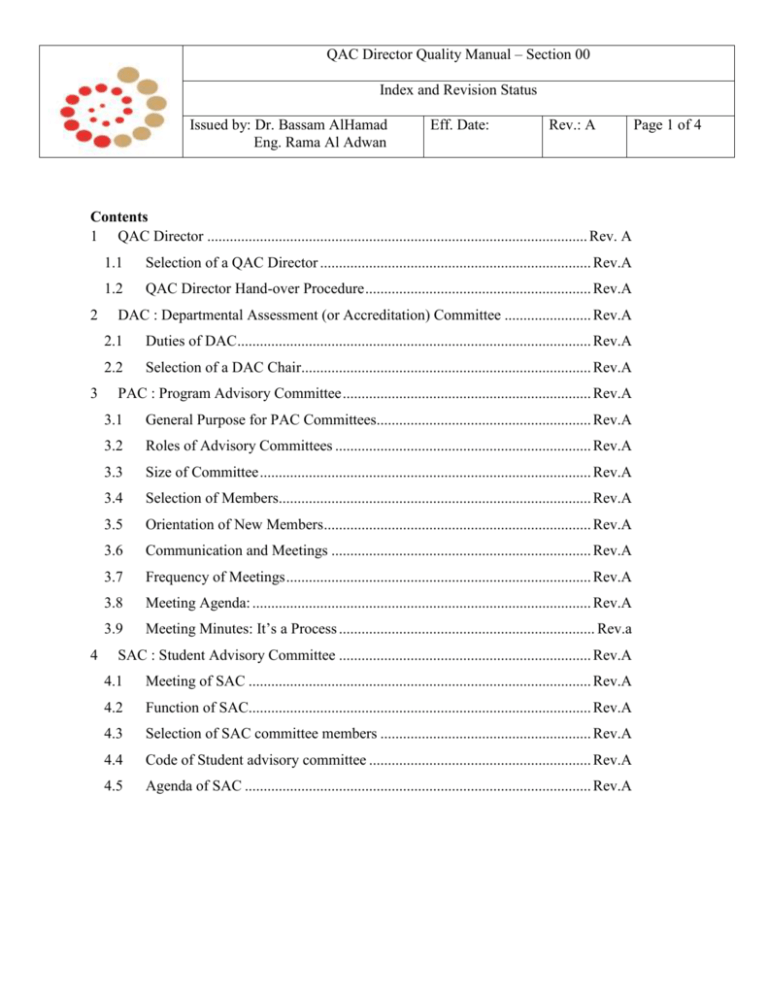rama departments
advertisement

QAC Director Quality Manual – Section 00 Index and Revision Status Issued by: Dr. Bassam AlHamad Eng. Rama Al Adwan Eff. Date: Rev.: A Contents 1 QAC Director ..................................................................................................... Rev. A 2 3 4 1.1 Selection of a QAC Director ........................................................................ Rev.A 1.2 QAC Director Hand-over Procedure ............................................................ Rev.A DAC : Departmental Assessment (or Accreditation) Committee ....................... Rev.A 2.1 Duties of DAC .............................................................................................. Rev.A 2.2 Selection of a DAC Chair............................................................................. Rev.A PAC : Program Advisory Committee .................................................................. Rev.A 3.1 General Purpose for PAC Committees......................................................... Rev.A 3.2 Roles of Advisory Committees .................................................................... Rev.A 3.3 Size of Committee ........................................................................................ Rev.A 3.4 Selection of Members................................................................................... Rev.A 3.5 Orientation of New Members ....................................................................... Rev.A 3.6 Communication and Meetings ..................................................................... Rev.A 3.7 Frequency of Meetings ................................................................................. Rev.A 3.8 Meeting Agenda: .......................................................................................... Rev.A 3.9 Meeting Minutes: It’s a Process .................................................................... Rev.a SAC : Student Advisory Committee ................................................................... Rev.A 4.1 Meeting of SAC ........................................................................................... Rev.A 4.2 Function of SAC........................................................................................... Rev.A 4.3 Selection of SAC committee members ........................................................ Rev.A 4.4 Code of Student advisory committee ........................................................... Rev.A 4.5 Agenda of SAC ............................................................................................ Rev.A Page 1 of 4 Index and Revision Status QAC Director Quality Manual Section 00 Rev.: A Page 2 of 4 Quality Forms , Procedure and Maps QF-1-rev.a.1 Meeting Agenda QF-2-rev.a.1 Meeting Minutes QF-3-rev.a.1 Attendance sheet QF-4-rev.a.1 Office Supply List QF-5-rev.a.1 AIMS Login Account Request QF-6-rev.a.1 Senior Exit Survey QF-7-rev.a.1 Alumni Survey QF-8-rev.a.1 Faculty Survey QF-9-rev.a.1 Employer Survey QF-10-rev.a.1 Training Workshop Survey QF-11-rev.a.1 Improvement Points Tracking Form QF-12-rev.a.1 Event Report QF-13-rev.a.1 Designer Checklist QF-14-rev.a.1 Survey Checklist QF-15-rev.a.1 Survey Analyst Template QF-16-rev.a.1 Audit Schedule QF-17-rev.a.1 Faculty checklist QF-18-rev.a.1 Audit Summary Report QF-19-rev.a.1 AIMS Data Audit Checklist QF-20-rev.a.2 Course Syllabus Form QF-21-rev.a.1 Academic Program Specifications Form QF-22-rev.a.1 Faculty CV Form QF-23-rev.a.2 Program Self Evaluation Report Template QF-24-rev.a.2 SER Rubric Template QF-25-rev.a.2 QAAC Self Evaluation Improvement Plan Index and Revision Status QAC Director Quality Manual Section 00 Rev.: A Page 3 of 4 QF-26-rev.a.1 Inactive Member Letter QF-27-rev.a.1 Letter Confirming Membership QF-28-rev.a.1 Recognition Recruitment Letter QF-29-rev.a.1 Secretary Course Portfolio Audit Checklist QF-30-rev.a.1 QAC(DAC)/QAC Director Course Audit Checklist QF-31-rev.a.1 Grade Distribution Form QF-32-rev.a.1 Assessment Distribution Form QF-33-rev.a.1 Assessment of PILOs, CILOs Form QF-34-rev.a.1 Handover Notes QF-35-rev.a.1 QAAC Director Course Portfolio Audit Checklist Quality Procedures QP-1-rev.a.1 Procedure for analyzing QAAC Survey QP-2-rev.a.1 QAAC Website Handout QP-3-rev.a.1 Survey Workshop Handout QP-4-rev.a.1 QAAC Website Editorial Guidelines QP-5-rev.a.1 Using the AIMS Online System QP-6-rev.a.2 Assessment Info. Management Sys QP-7-rev.a.1 Auditing Procedure QP-8-rev.a.1 QAAC Recommended Standards QP-9-rev.a.1 Workshop on An Overview of OutcomeBased Assessment at UOB QP-10-rev.a.1 workshop on Developing Course Learning Outcomes and Portfolios QP-11-rev.a.1 Workshop on Performance Indicators and Program Self-Evaluation QP-12-rev.a.1 QAAC-Performance Indicators-Arabic- QP-13-rev.a.1 QAC Handover Procedure Index and Revision Status QAC Director Quality Manual Section 00 Rev.: A Page 4 of 4 Process Map PM-1-rev.a.1 Submission & Audit of Course Portfolio PM-10-rev.a.1 AIMS Data Internal Audit PM-11-rev.a.1 Academic Program Assessment Process PM-12-rev.a.1 Overall Program Quality Assurance Process PM-13-rev.a.1 Program Annual OFIs and Action Plan Process QAC Director Quality Manual – Section 1 QAC Director Issued by: Dr. Bassam AlHamad Eng. Rama Al Adwan Eff. Date: Rev.: A Page 1 of 3 1 QAC Director The QAC director is the reference and the guide for the duties of the DAC. The following duties are the main duties of the QAC director: 1- He/she runs the meetings with the DAC committees and ensures the performance of DAC duties. One meeting per month would be sufficient to run the quality matters in normal conditions. In a process to achieve accreditation, more frequent meetings are expected. 2- The QAC director is responsible to monitor and maintain the quality of programs in the college. The QAC director is therefore responsible to provide the required training, in coordination with the QAAC Center. 3- The QAC director is responsible to monitor the data entry of the Program Specifications according to the ( QP-8-rev.a.1, QF-22-rev.a.1, QF-20-rev.a.2, QF-21-rev.a.1 ) within the website, however the data-entry task is done within the programs under the responsibility of the program/department. 4- Any program undergoing the accreditation process is to consult the QAC officer to assist in the process of accreditation. 5- The QAC director works as a key-person in delivering all requirements by QAAC Center to the departments. Therefore, the QAAC director is expected to provide the departments with all information regarding senior exit survey QF-6-rev.a.1, faculty survey QF-8rev.a.1, Annual meetings, SER reports QF-23-rev.a.2 target dates, etc. 6- The QAC director is to ensure that all programs are abiding to their duties, such as conducting alumni QF-7-rev.a.1 and employer QF-9-rev.a.1surveys according to (QP15-rev.a.1), assessing PEOS, PILOs and CILOS (please see QF-33-rev.a.2), PIs formulation, developing improvement plans QF-11-rev.a.1, managing course portfolios according to the auditing procedure and process map (QP-7-rev.a.1/ PM-1-rev.a.1) , etc. 7- The QAC director is expected to provide the QAAC Center with the latest performance of the programs in the QA meeting between the QAAC director and the QAC directors which held every two weeks. 8- The QAC director is the key-connection for all documents formulated by QAAC, or delivering the documents (SER report( QF-23-rev.a.2), improvement action plan (QF-25rev.a.2) submitted by the department to QAAC. 9- The QAC director is to maintain the minutes of meeting with the DAC Chairs. 10- The QAC director is to follow-up the update of the PAC/SAC/DAC committees. 11- QAC Director is responsible to supervise and follow up NQF project within his/her college according to the Mapping UOB Programs to NQF level Descriptor Procedure (QP-14-rev.a.2) QAC Director QAC Director Quality Manual Section 1 Rev.: A Page 2 of 3 12- Workshop Activities or Training Sessions by QAC/DAC may include: a. Discussing the program educational objectives and unique program outcomes (other than a – k) that address specific strengths of their programs. b. Analyze outcomes into elements and define a set of specific skills for each element. c. Discuss Course Intended Learning Outcomes (CILOs) that incorporate these skills and create a plan for assessing each objective using graded student work. d. Select outcome indicators and performance targets to quantify the achievement of each outcome. e. Develop / adapt special rubrics to accurately assess student performance in each outcome, especially in those that involve soft skills (ex. teamwork, lifelong learning, contemporary issues, ethics, global and societal issues, communication, etc.). f. Discuss course and curriculum design that address specific program outcomes and / or increase student achievement in critical areas. g. Design / adapt a systematic process and a timeline for assessing program educational objectives and program outcomes on a regular basis with minimum faculty workload. h. Discuss challenges inherent in the implementation of a continuous improvement process and brainstorm ways to overcome challenges. i. Raise awareness about the importance of the National Qualifications Framework j. Train faculty members on the process for mapping their courses to the NQF and on how to prepare and fill in the Course Syllabus Form (QF-20-rev.a.2) and the mapping scorecard form (QF-38-rev.a.1). 1.1 Selection of a QAC/ Director President of the University is responsible for the appointment of the QAC Director in each college every two years. The selection of a QAC Director is based on the following criteria: - The QAC Director should have the required knowledge in the field of quality education. Such knowledge would include the understanding of the process of formulating and assessing the PEOs, PILOs and CILOs.(please see QF-33-rev.a.2). Such knowledge would include understanding the concept of conducting the surveys and how to gain improvement actions from the surveys. The QAC Director should have the sufficient communication skills with a visionary and management personality QAC Director QAC Director Quality Manual Section 1 Rev.: A Page 3 of 3 Note: for more information please read all quality procedures (QP) and quality forms (QF) and Process maps (PM)such as: QP-7-rev.a.1 Auditing Procedure QP-8-rev.a.1 QAAC Recommended Standards QP-9-rev.a.1 Workshop on An Overview of OutcomeBased Assessment at UOB QP-10-rev.a.1 workshop on Developing Course Learning Outcomes and Portfolios QP-11-rev.a.1 Workshop on Performance Indicators and Program Self-Evaluation QP-12-rev.a.1 QAAC-Performance Indicators-Arabic- QP-14-rev.a.2 Mapping UOB Programs to NQF level Descriptor Procedure QF-33-rev.a.2 CILOs, PILOs Assessment PM-11-rev.a.1 Academic Program Assessment Process PM-12-rev.a.1 Overall Program Quality Assurance Process PM-13-rev.a.1 Program Annual OFIs and Action Plan Process 1.2 QAC Director Hand-over Procedure (QP-13-rev.a.1) Handover procedure is used to help future employee understand what needs to be done in order to maintain performance in that job. It is made by QAC Director who is leaving and are given to the employee who is starting their shift. 1. To hand-over your job to your replacement please follow the procedure (QP-13-rev.a.1). QAC Director Quality Manual – Section 2 DAC Committee Issued by: Dr. Bassam AlHamad Edited by : Eng. Rama Al Adwan Eff. Date: Rev.: A Page 1 of 4 2 DAC Departmental Assessment (or Accreditation) Committee/QAC (Quality Assurance Committee) The DAC/QAC is the steering force behind the assessment and quality assurance process. It coordinates the quality assurance and accreditation activities and is responsible for organizing and reviewing the program outcomes, objectives, course portfolios, assessment (PM-11-rev.a.1) and survey data, as well as writing the self-evaluation report draft. (Note: some departments assign this role to the Curriculum Committee, Academic Committee, or the Quality Assurance Committee). Figure 1 shows the roadmap of the QAC/DAC Director. Figure 2 shows the role of the QAC/DAC Director with the timeline of the roles of the QAAC and QAC. 2.1 Duties of DAC/QAC The duties of the DAC/QAC committee are the following: 1- Work in hand with the QAC Director for the preparation and Revision of the Program Educational Objectives (PEOs), Program Intended Learning Outcomes (PILOs), Performance Indicators (PIs), and Course Intended Learning Outcomes (CILOs). QAAC Recommended Standards (QP-8-rev.a.1), also QP-9-rev.a.1, QP-10-rev.a.1, QP-11rev.a.1, QP-12-rev.a.1 are recommended to use while formulating the PEOs, PIs, CILOs, etc. 2- Work in hand with the faculty to assess the PEOs using surveys ( QF-7-rev.a.1, QF-9rev.a.1), and assess PILOs - PIs & CILOs using the assessment types and learning activities (PM-11-rev.a.1) and (QF-33-rev.a.2). 3- Conducting the surveys (alumni QF-7-rev.a.1, employer QF-9-rev.a.1) according to the procedure (QP-15-rev.a.1) and analyzing the results QP-1-rev.a.1 coming out with improvement actions for the program QF-11- rev.a.1. The senior-exit survey QF-6rev.a.1 and faculty survey QF-8-rev.a.1 are handled by the QAAC center. 4- Form and meet with the advisory committees, SAC and PAC. Prepare for the Agenda QF-1- rev.a.1 and writing up of the minutes QF-2-rev.a.1. DAC Committee QAC Director Quality Manual Section 2 Rev.: A Page 2 of 4 5- Make sure that course portfolios are prepared at the end of each semester according to the auditing procedure(QP-7-rev.a.1) and process map (PM-1-rev.a.1) 6- Audit of course portfolios using the Auditing Procedure QP-7-rev.a.1 to fill Audit Summary Report QF-18-rev.a.1. 7- Preparation of SER Report QF-23-rev.a.2. 8- Prepare QAAC Self Evaluation Improvement Plan QF-25-rev.a.2 with the Chairperson 9- Follow-up the implementation of action concerning the activities above. 10- DAC/QAC committee is responsible to map the academic programs to the NQF level according to the Mapping UOB Programs to NQF level Descriptor Procedure (QP-14rev.a.2) 11- Running training sessions ensuring the spread of the culture of quality level of learning. (QP-9-rev.a.1) Workshop on An Overview of Outcome-Based Assessment at UOB (QP-10-rev.a.1) workshop on Developing Course Learning Outcomes and Portfolios (QP-11-rev.a.1) Workshop on Performance Indicators and Program Self-Evaluation (QP-12-rev.a.1) QAAC-Performance Indicators-Arabic 2.2 Selection of a DAC/QAC Chair Program chair person is responsible for the appointment of the DAC /QAC committee in each college every one year. The selection of a DAC Chair is based on the following criteria: 1- The DAC/QAC Chair should understand the philosophy of quality in education and its influence on academic life. 2- The DAC/QAC Chair should have been a DAC member to be able and have the capability of running training sessions, revising portfolios, having the knowledge of assessing PEOs and PILOs, etc. 3- The DAC/QAC Chair should have a good understanding of the tasks of the main committees in the program, such as the Academic Committee. 4- The DAC/QAC Chair should be able to coordinate, having good managing and communication skills. 5- The DAC/QAC Chair should be an active member DAC Committee QAC Director Quality Manual Section 2 Rev.: A Figure 1: Roadmap of QAC/DAC Director Page 3 of 4 DAC Committee QAC Director Quality Manual Section 2 Rev.: A Figure 2: Timeline of QAC Director, DAC Committee Page 4 of 4 QAC Director Quality Manual – Section 3 PAC Committee Issued by: Dr. Bassam AlHamad Eng. Rama Al Adwan Eff. Date: Rev.: A Page 1 of 5 3 PAC : Program Advisory Committee The PAC serves an advisory role for the program and its development. The PAC is usually composed of employers, scholars, or any other external person representing a stakeholder (industry, business, government, other agencies) with an interest in the quality of the program's graduates. 3.1 General Purpose for PAC Committees One of the most common characteristics associated with high-quality academic programs is their close ties with business, industry, and labor. Education today must align with and fulfill employers’ needs for competent, high-performing employees who enter the workforce with technology expertise and fundamental job-success skills. Because academic programs must be integral parts of the communities they serve, it is necessary to have close cooperation between the college and local employers. One of the most effective ways of providing a link between the community and the college is through advisory committees. Advisory committees are essential and play an important role in guiding, strengthening, and improving existing programs. The Programs must be inter-linked with the business, industry, and labor representatives who indeed have a wealth of expertise, personnel, and technologies to offer community and college systems. What is an advisory committee? An advisory committee is a group of employers and employees who advise educators on the design, development, implementation, evaluation, maintenance, and revision of academic programs. Each advisory committee is made up of individuals with experience and expertise in the field that the program serves. 3.2 Roles of Advisory Committees The roles of the advisory committee are to advise, assist, support, and advocate the academic programs. Advisory committees also provide specifications for a program and help to ensure the quality of program graduates. An advisory committee’s role is offer suggestions for improvements that will help the program grow and expand. Advisory committees can provide: Labor market needs and trends Advise to the formulation of the Program’s PEOs PAC Committee QAC Director Quality Manual Section 3 Rev.: A Page 2 of 5 Specifications Validation of content Assessment of program quality (PM-11-rev.a.1) Unique education/training experiences Credibility Assistance in adapting skill standards for local needs A successful advisory committee is one that plans and carries out a program of work that aligns the technical/occupational program with employers’ needs. The program of work will most likely include these broad areas: Assessment and counsel—The advisory committee assesses each area of the program and offers suggestions on ways to improve that area. For example, the committee might suggest ways to modify the curriculum, review teaching materials for technical accuracy, provide information on equipment and vendors, and establish safety guidelines. Assistance—The advisory committee assists the program by helping instructors and administrators secure mentors and internships for students. The committee also assists with placement of graduates. Promotion and support—The advisory committee promotes the academic program in the community. Promotion and support can take forms such as communicating with effective groups, and authoring newspaper articles. 3.3 Size of Committee The size and composition of an effective advisory committee should be appropriate to meet the educational, economic, social, and cultural obligations of the program and the college. The number of persons appointed to an advisory committee should be determined by the committee’s functions, the size of the program, and the size of the community. The “one size fits all” approach doesn’t work. At the same time, certain general parameters should be kept in mind. Committees with fewer than five members may have limited perspective, inadequate information on career fields, and too little diversity. Committees with more than 12–18 members can become unmanageable. In many cases, a membership of 6–12 is ideal. 3.4 Selection of Members The selection of the Advisory committee relies on the Department Council, under the leadership of the chairperson. Advisory committees should consist primarily of employers. To be effective, committee members should have a clear sense of trends in the field. They should be able to identify skills that will ensure the employability of your program’s graduates, and they should be able to identify jobs that don’t yet exist but are likely to in the near future. This is necessary to keep your program on the cutting edge. When recruiting members, identify committed leaders and seek members who express sincere interest in the program, have the confidence of others in PAC Committee QAC Director Quality Manual Section 3 Rev.: A Page 3 of 5 the community, and are dedicated to the occupation and the community. In the development of a new advisory committee, college personnel should visit business sites to demonstrate their desire to build a true partnership that embraces the needs of employers. Members are expected to have good communication skills; should be able to express their ideas clearly; and must be able to respect, tolerate, and work with ideas expressed by others. The PAC committee members are selected, taking into consideration with the following criteria: 1. 2. 3. 4. Appropriate experience and knowledge in the program area Good standing in the community Awareness of the market needs Commitment to the program improvement A rotational, two-year term (with possible reappointment) of service allows for both continuity and change. Committee membership should be reviewed and updated yearly to ensure broadbased representation of the industry and to ensure that the work of the committee continues. Please, refer to the recognition/regret letters for PAC active/inactive members as following: QF-26-rev.a.1 QF-27-rev.a.1 QF-28-rev.a.1 Inactive Member Letter Letter Confirming Membership Recognition Recruitment Letter The QAC committee nominates PAC members, who are to be reviewed and approved by department council. 3.5 Orientation of New Members The committee’s success will depend to a large extent on how well members understand their roles at the first meeting they attend. New and continuing advisory committee members should be regularly provided with information relative to the committee’s purpose, function, structure, and goals as expressed in the committee’s work plan. Orientation meetings often involve tours of employer facilities and presentations about the program. Discussion of current issues that affect the program should also be included. Items in your orientation guide could include the following: Background on the college Admission policies Mission statement and value statements Organizational chart Programs offered Program or cluster overview Curriculum (scope and sequence) Facilities and equipment Roles and responsibilities (both individual and collective) Membership issues PAC Committee QAC Director Quality Manual Section 3 Rev.: A Page 4 of 5 Committee program of work and accomplishments A master copy of the Advisory and Quality Assurance (AQA) guide should be kept on file and, if possible, should be posted on the web. In addition to the AQA guide, new members can receive college catalogs, class schedules, program brochures, departmental history, student retention and placement statistics, and local economic development news. 3.6 Communication and Meetings Communication with members will occur in both formal and informal settings. Advisory committees should strive to streamline formal face-to-face meetings as much as possible. Meetings should lay the groundwork for creating a productive atmosphere in which time is well spent. One meeting per semester is preferable; however, once per year is the minimum. Meeting discussions should focus on the agenda QF-1-rev.a.1, and every attempt should be made to involve each member. Time should be allowed for open, free discussion on the strengths and weaknesses of the program. The committee chair should be able to draw on the expertise of individual committee members. The committee should establish meeting ground rules. These rules could include the following: Encourage everyone to participate equally. Share ideas freely. Provide constructive suggestions rather than negative criticisms. Stay on track and on time. Be concise. 3.7 Frequency of Meetings The frequency of the committee’s meetings will be dictated by the work plan. Most committees meet at least twice a year. However should NEVER be called simply for the sake of holding a meeting. There should always be a reason for a meeting. Meetings should be scheduled to facilitate timely development, implementation, and evaluation of the committee’s work plan. What time to meet—The best time of the day for advisory committee meetings depends on the calendars of those who must attend, especially business, industry, and labor representatives. Many will prefer either a breakfast meeting or a luncheon meeting. Because of work schedules and commuting time, some may prefer evenings. Regardless of what time a meeting is scheduled, most members will appreciate refreshments. Where to meet—Meetings can be held at the college, a local restaurant, or at the company facilities of the advisory committee member. The location should be whatever is most convenient for the majority of the committee’s members. PAC Committee QAC Director Quality Manual Section 3 Rev.: A Page 5 of 5 How long to meet—A meeting does not need to be long to be effective. The constant should be quality of content, not time. Most meetings will last one to two hours. 3.8 Meeting Agenda: A well organized agenda QF-1-rev.a.1 and having the discussion stay on topic can contribute to the success of the committee. On general, the agenda of the Advisory Committee is: 1. Curriculum 2. Staff development 3. Career development and work-based learning 4. Marketing and advocacy 5. Student recruitment, mentoring, and placement 6. Program resources 7. Evaluation (of the program and the advisory committee itself) 3.9 Meeting Minutes: It’s a Process All advisory committees and subcommittee meetings must have written minutes QF -2-rev.a.1. Minutes are the official record of the committee’s activities. They help members understand the group’s progress, concerns, decisions, and actions. It is not necessary to record all discussions. Minutes generally include a listing of those who attended the meeting (name, occupation, and organization), a summary of each issue that was discussed, and any decisions, assignments, or recommendations that were made. Written minutes should be submitted to the committee chair for review and signature. The minutes should be sent out in a timely fashion (1–2 weeks) after the meeting. In addition, previous minutes may be sent with the notice for the upcoming meeting. A record of all past meeting minutes and a membership roster should be kept in the QAAC’s AIMS website. QAC Director Quality Manual – Section 4 SAC Committee Issued by: Dr. Bassam AlHamad Eng. Rama Al Adwan Eff. Date: Rev.: A Page 1 of 2 4 SAC : Student Advisory Committee The SAC is a committee composed of junior and senior students currently enrolled in the program. The committee serves as a representative of the students as stakeholders in the program. The committee is updated each year by replacing the senior students who graduate with other students. SAC is consulted on assessment results and any major changes in the program. 4.1 Meeting of SAC In most departments, the DAC/QAC organizes and chairs the advisory committee that includes students and that meets at regular intervals during the year to review aspects of the department's undergraduate curriculum. 4.2 Function of SAC The SAC committee is a committee/focus group that would provide advice to the owners of the program in the aim to improve the program The SAC committee advises the department on matters such as ideas for new courses and programs, proposals for improvement of instruction or advising in the department, and suggestions for changes in the requirements of the major, representing difficulties in certain fields, such as Math and English, proposing to change prerequisite positions, etc. The Student Advisory Committee (SAC) for the undergraduate program advises the program director about students’ concerns and helps to coordinate extra-curricular activities to benefit the students. The results of PILOs reports would also be presented to the students to tell the students the weak areas they need to strengthen themselves in. They could answer the reasons for the weaknesses, which could be improvement actions formulated into the strategy of program development. 4.3 Selection of SAC committee members The selection of the SAC committee would be to the choice of the department, and approved in the department council. It is recommended to select the students from each academic year, as well as covering the range of GPAs form 2 to 4, preferable above 2.5 PAC Committee QAC Director Quality Manual Section 3 Rev.: A Page 2 of 2 4.4 Code of Student advisory committee Members of the student advisory committee may be reappointed by the department chair with the essence of the department council to serve subsequent or consecutive terms. The department chair person shall ensure that at least one member of the student advisory committee is reappointed each year. The student advisory committee shall elect a chairman from among its members. The advisory committee shall meet at least twice annually and shall advise the department regarding matters related to academic matters. 4.5 Agenda of SAC The agenda QF -1- rev.a.1 could include but not limited to: 1. 2. 3. 4. 5. 6. ideas for new courses and programs, proposals for improvement of instruction advising in the department suggestions for changes in the requirements of the major lab facilities library facilities & timings





